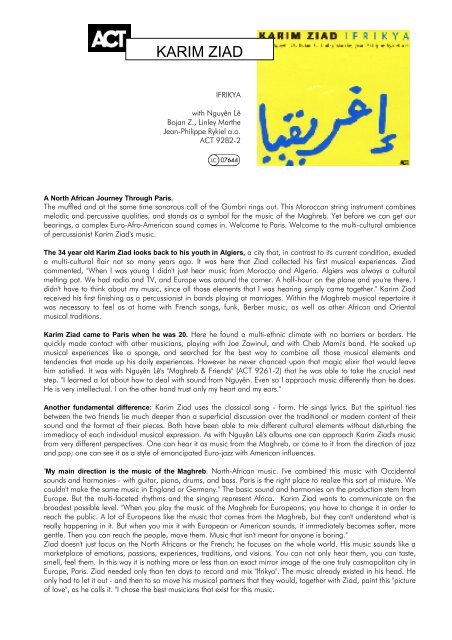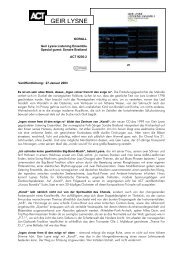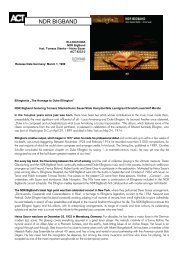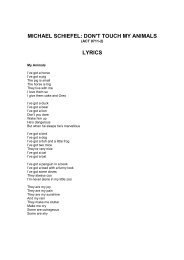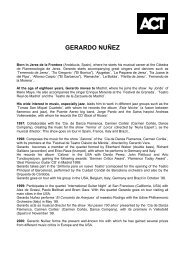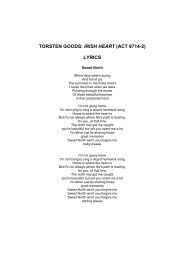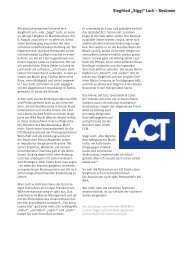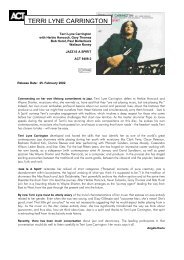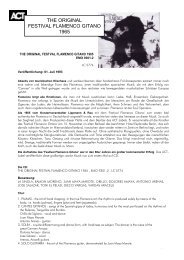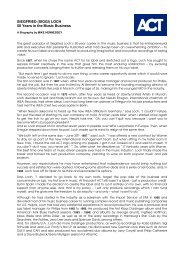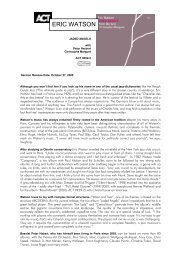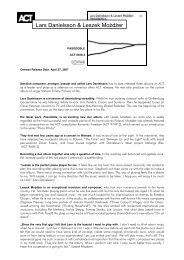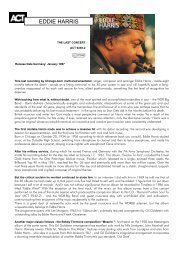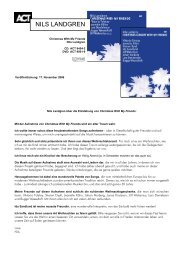Create successful ePaper yourself
Turn your PDF publications into a flip-book with our unique Google optimized e-Paper software.
<strong>KARIM</strong> <strong>ZIAD</strong><br />
IFRIKYA<br />
with Nguyên Lê<br />
Bojan Z., Linley Marthe<br />
Jean-Philippe Rykiel a.o.<br />
ACT 9282-2<br />
A North African Journey Through Paris.<br />
The muffled and at the same time sonorous call of the Gumbri rings out. This Moroccan string instrument combines<br />
melodic and percussive qualities, and stands as a symbol for the music of the Maghreb. Yet before we can get our<br />
bearings, a complex Euro-Afro-American sound comes in. Welcome to Paris. Welcome to the multi-cultural ambience<br />
of percussionist Karim Ziad's music.<br />
The 34 year old Karim Ziad looks back to his youth in Algiers, a city that, in contrast to its current condition, exuded<br />
a multi-cultural flair not so many years ago. It was here that Ziad collected his first musical experiences. Ziad<br />
commented, "When I was young I didn't just hear music from Morocco and Algeria. Algiers was always a cultural<br />
melting pot. We had radio and TV, and Europe was around the corner. A half-hour on the plane and you're there. I<br />
didn't have to think about my music, since all those elements that I was hearing simply came together." Karim Ziad<br />
received his first finishing as a percussionist in bands playing at marriages. Within the Maghreb musical repertoire it<br />
was necessary to feel as at home with French songs, funk, Berber music, as well as other African and Oriental<br />
musical traditions.<br />
Karim Ziad came to Paris when he was 20. Here he found a multi-ethnic climate with no barriers or borders. He<br />
quickly made contact with other musicians, playing with Joe Zawinul, and with Cheb Mami's band. He soaked up<br />
musical experiences like a sponge, and searched for the best way to combine all those musical elements and<br />
tendencies that made up his daily experiences. However he never chanced upon that magic elixir that would leave<br />
him satisfied. It was with Nguyên Lê's "Maghreb & Friends" (ACT 9261-2) that he was able to take the crucial next<br />
step. "I learned a lot about how to deal with sound from Nguyên. Even so I approach music differently than he does.<br />
He is very intellectual. I on the other hand trust only my heart and my ears."<br />
Another fundamental difference: Karim Ziad uses the classical song - form. He sings lyrics. But the spiritual ties<br />
between the two friends lie much deeper than a superficial discussion over the traditional or modern content of their<br />
sound and the format of their pieces. Both have been able to mix different cultural elements without disturbing the<br />
immediacy of each individual musical expression. As with Nguyên Lê's albums one can approach Karim Ziad's music<br />
from very different perspectives. One can hear it as music from the Maghreb, or come to it from the direction of jazz<br />
and pop; one can see it as a style of emancipated Euro-jazz with American influences.<br />
"My main direction is the music of the Maghreb. North-African music. I've combined this music with Occidental<br />
sounds and harmonies - with guitar, piano, drums, and bass. Paris is the right place to realize this sort of mixture. We<br />
couldn't make the same music in England or Germany." The basic sound and harmonies on the production stem from<br />
Europe. But the multi-faceted rhythms and the singing represent Africa. Karim Ziad wants to communicate on the<br />
broadest possible level. "When you play the music of the Maghreb for Europeans, you have to change it in order to<br />
reach the public. A lot of Europeans like the music that comes from the Maghreb, but they can't understand what is<br />
really happening in it. But when you mix it with European or American sounds, it immediately becomes softer, more<br />
gentle. Then you can reach the people, move them. Music that isn't meant for anyone is boring."<br />
Ziad doesn't just focus on the North Africans or the French; he focuses on the whole world. His music sounds like a<br />
marketplace of emotions, passions, experiences, traditions, and visions. You can not only hear them, you can taste,<br />
smell, feel them. In this way it is nothing more or less than an exact mirror image of the one truly cosmopolitan city in<br />
Europe, Paris. Ziad needed only than ten days to record and mix "Ifrikya". The music already existed in his head. He<br />
only had to let it out - and then to so move his musical partners that they would, together with Ziad, paint this "picture<br />
of love", as he calls it. "I chose the best musicians that exist for this music.
Abdelkbir Merchane, the singer on the first piece, is the best Gnawa player that I know. The bassist is Linley Marthe<br />
from Mauritius. The pianist, Boris Zulfikarpasic wrote the song "The Joker”. If you didn't know that this song came<br />
out of Bosnia, you would take it for Algerian. I already played with Martinique's Michel Aliba on "Maghreb and<br />
Friends". There is also the blind French-Jewish keyboard player Jean-Philippe Rykiel, who has worked a lot with<br />
musicians like Youssou N'Dour and Salif Keita. Besides that there are several background vocalists who come from<br />
the Maghreb. And of course Nguyên Lê. I myself play a variety of instruments, from keyboards through bass to<br />
guitar."<br />
Wolf Kampmann<br />
The CD:<br />
Ifrikya - Karim Ziad - ACT 9282-2 - LC 07644<br />
Line Up:<br />
Karim Ziad (vocals, drums, percussion, gembri, guitar, mandola) / Abdelkbir Merchane (vocals) / Hamid Mestari<br />
(vocals, outar) / Abdenour Djemaï (banjo, mandola, vocals) / Menni Mohamed (percussion, vocals) / Khliff<br />
Miziallaoua (guitar, vocals) / Nguyên Lê (guitar) / Bojan Zulfikarpasic (piano) / Jean-Philippe Rykiel (synthesizer)<br />
David Aubel (flute) / Ali Wague (pehl flute) / Linley Marthe (bass) / Michel Alibo (bass) / Alain Debiossat<br />
(saxophones) / Vincent Mascart (tenor saxophone) / Gaëlle Hervé & Marielle Hervé (background vocals)<br />
Tracks:<br />
1 Aît Oumrar (trad. arr. by Karim Ziad / Abdelkbir Merchane) 2. Ya Rijal (Karim Ziad / Nguyên Lê)<br />
3. Awra (trad. arr. by Karim Ziad / Hamid Mestari) 4. Lebnia (trad. arr. by Karim Ziad)<br />
5. Alouhid (Karim Ziad / Takfarinas / Nguyên Lê) 6. Sandiya (trad. arr. by Karim Ziad / Abdelkbir Merchane)<br />
7. Amaliya (trad. arr. by Karim Ziad) 8. Gwarir (Karim Ziad) 9. The Joker (Bojan Zulfikarpasic)<br />
10. Nesrafet (Karim Ziad)<br />
Produced by Karim Ziad, recorded at Studio Davout, France, by Jean Loup Morette in June / July 2000<br />
Mastered at Studio Topmaster, France, by Andre Perriat<br />
Release Date: February 2001<br />
Distribution: Night & Day (F), I.R.D.(I), Coast To Coast (NL), Proper Distribution (UK), Karonte (E), Dargil (P), Amigo<br />
(S), Musikklosen (N), A&N Records (GR), Equinox Music (TR), Distribution Fusion III (CAN), P&J Music (CZ), GIGI<br />
Distribution (PL), Jahipaun (EST), Universal Music K.K./IMS (J), C&L Records (ROK), MVZ (CH), LC Music (B), Jassics<br />
(ZA), NMC Music (IL), Jazz Fest Sarajevo (BIH)<br />
For further informations please contact:<br />
<strong>KARIM</strong> <strong>ZIAD</strong><br />
Ehrengutstrasse 28, 80469 München, Germany<br />
Phone +49 89 72 94 92 0, Fax +49 89 72 94 92 11<br />
e-mail: info@actmusic.com<br />
Visit our website at http://www.actmusic.com


